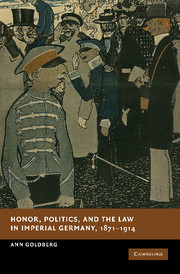Conclusion: Beyond 1914
Published online by Cambridge University Press: 03 May 2010
Summary
It was October, 1965. The war in Vietnam was massively escalating under US President Johnson, and a group of German protestors, bearing banners and shouting antiwar slogans, gathered near the US embassy in Bonn. Amid a welter of angry denunciations (“Vietnam: America's Auschwitz,” “Negotiations, Not Murder”), one chant caught the authorities attention: “Child Murderer Johnson – Child Murderer Johnson.” A slanderous attack against a named head of state, albeit a foreign one, constituted a criminal offense under §103 of the German penal code. An investigation was opened – the leaders of the demonstration, in addition to the above offense, were reputed to have communist connections – and the US State Department contacted about pressing charges. But the US had a very different legal history and no law approaching that of §103. There ensued a moment of diplomatic confusion. Possibly stunned, the US State Department had to confess to the absence in American law of any basis for prosecution. The Germans were thus forced to drop the case. The case is reminiscent of one seventy years earlier when the German authorities under the Kaiser advised their Belgian counterparts of “their right to prosecute” the German Socialist editor Reinhold Stenzel for an article in a German newspaper attacking the Belgian King Leopold II for “his colonial exploits” and other matters. The outcome in this earlier instance, however, was different: the case went to trial and Stengel was given an eight-month prison sentence.
- Type
- Chapter
- Information
- Honor, Politics, and the Law in Imperial Germany, 1871–1914 , pp. 193 - 212Publisher: Cambridge University PressPrint publication year: 2010



